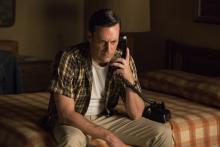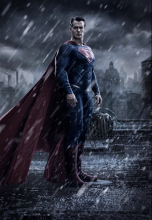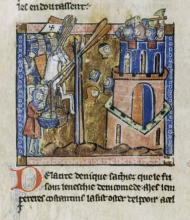Film

Spike Lee didn’t plan Chi-Raq’s release to coincide with a year in which the number of mass shooting on record surpassed the number of days in the year thus far . Nobody could have expected that days before the film’s release, the shooting in San Bernadino, Calif., would push the gun debate to (another) boiling point, with cries for legislative action in addition to the frequent “thoughts and prayers” of politicians.
That most people are Chi-Raq with the shootings in California fresh in their minds is a coincidence — one which makes the film’s message all the more immediate.
Chi-Raq is a satirical drama, a modern retelling of the ancient Greek Lysistrata. In Lee’s version of the story, Lysistrata (Teyonah Parris of Dear White People) is the girlfriend of Chi-Raq (Nick Cannon), a rapper and gang leader on the south side of Chicago. He’s also in the midst of a war with Cyclops (Wesley Snipes), the leader of a rival gang. When a young girl in the neighborhood is killed by a stray bullet, Lysistrata rallies women affiliated on both sides of the gang war to demand peace by denying their men sex.
What starts as a protest becomes a movement, taking the city of Chicago and the world by storm.

Starring Michael Keaton, Mark Ruffalo, Rachel McAdams, Liev Schreiber, John Slattery, Brian d’Arcy James, and Stanley Tucci, SPOTLIGHT tells the riveting true story of the Pulitzer Prize-winning Boston Globe investigation that would rock the city and cause a crisis in one of the world’s oldest and most trusted institutions. When the newspaper’s tenacious “spotlight” team of reporters delves into allegations of abuse in the Catholic Church, their year-long investigation uncovers a decades-long cover up at the highest levels of Boston's religious, legal, and government establishment, touching off a wave of revelations around the world.
Pixar, the computer animation studio beloved for its kid-friendly fare such as Finding Nemo and Inside Out, is not known for taking on religious themes.
But its newest short film tells a personal story about a boy who learns to appreciate his religious heritage by envisioning the Hindu gods as superheroes.
Sanjay’s Super Team, directed by artist Sanjay Patel, is based on Patel’s relationship with his father and his experience growing up in California as the son of Indian-American immigrants.
“This is a very personal story; it’s the truth about how I grew up,” Patel said.
“It’s about how difficult it is for different generations to see eye to eye.”

When I first saw the DeLorean rush toward me at the end of Back to the Future, I was 11 years old, and I felt alive in a way that I’m not sure I had experienced before. The endings of the films of Robert Zemeckis would continue to give me that rush of good feeling—Tom Hanks at the crossroads in Cast Away, and on the tree stump waiting for his little son to come home from school in Forrest Gump; Denzel Washington faced with the question “Who are you?” in Flight. Some critics, believing that things need to be difficult in order for them to be good, find it easy to turn down a Zemeckis invitation. I beg to differ—there’s no contradiction in loving the populist sentiment of E.T. the Extra-Terrestrial, the serious melodrama of The Elephant Man, the painful and nonlinear narrative of Exotica, the surreal plunge into the human shadow of Enter the Void, and the high art intellectual sensibilities of Eternity and a Day. And those are just a handful of very different films beginning with the letter “E.” Authenticity is what matters, not how “elite” the work can appear to be.
Zemeckis makes large-scale populist entertainment that makes us laugh and cry, but he deals in authenticity. Along with the fun and the flights (Forrest running across the U.S., Marty McFly and Doc Brown’s race to connect the wires with the clock tower, and two of the most harrowing plane crashes in the movies), emotional beats are earned, characters behave as they might in real life (even if they are in a time-traveling sports car or abandoned on an island), and audiences get the chance to wrestle with the same question faced by Denzel: Who am I?

At one point in the new film The Walk, high-wire walker Philippe Petit (Joseph Gordon-Levitt) is asked, after successfully walking a tightrope strung between the two towers of the World Trade Center, why he chose to perform such a dangerous, death-defying act. His answer: “There is no ‘why.’ I just look for a place to hang my wire, and when I find it, I put it there.”
There are a couple of ways you could take this statement. One is a thrilling feeling of limitless possibility. The other is a little more disconcerting: that there was no deeper meaning; Petit simply did it because, well, why not?

MY FRIEND the architect Colin Wishart says that the purpose of his craft is to help people live better. Just imagine if every public building, city park, urban transportation hub, and home were constructed with the flourishing of humanity—in community or solitude—in mind. We might be inspired to create new, hopeful thoughts, friendships with strangers, or projects that bring transformation into the lives of others.
It is easy to spot architecture divorced from its highest purpose. In a building or other space made to function purely within the bounds of current economic mythology—especially those created to house the so-called “making” of money—the color of hope only rarely reveals itself. Instead we are touched by melancholy, weighed down by drudgery, compelled by the urge to get away. But when we see a space whose stewards seem to have known that human kindness, poetry, and breathing are more important than the “free” market, we realize that it is possible to be always, everywhere, coming home. Think of a concert hall designed for the purest acoustics, a playground where the toys blend in with the trees, a train station where the transition from one place and way of being to another has been honored as a spiritual act.

The decision to focus just on the Christian relationships takes away from the complex and morally grey issues surrounding war. As a younger viewer, I left the film with a series of questions: did the directors think the U.S. intervention in Vietnam was justified? Should we have left at an earlier time? How do we deal with the ethical atrocities that were committed by U.S. forces, such as the use of napalm?
While Little Boy and Faith of Our Fathers are films made by different teams and creators with different interests, they both reflect an intrinsic tendency in the Christian film industry to "clean things up." Both films ignore the darker moral implications of the symbols they choose. While the filmmakers clearly want to remember the people who fought in these wars, their attempts at cleaning up history so that it’s family friendly doesn’t do the veterans the justice they deserve.

If a briefcase of money fell in your lap, would you keep it, share it, or give it all away?
The new reality show The Briefcase is asking that question. But viewers and ethicists are asking more:
How could CBS put this on the air? Are there better ways to address the financial challenges of the middle class?
The hourlong show, which airs its fourth episode June 17, introduces two families each episode with the struggles of bills and not enough money coming in to achieve all their goals — whether dealing with a lost job, medical bills, or the potential costs of in vitro fertilization.

Among the big releases this summer, two films offer new installments of iconic franchises. One, Mad Max: Fury Road is a master class in how to do it right. Made as a labor of love, not a studio cash-grab, it uses a familiar setting and hero to explore new artistic territory, and still maintains an insanely entertaining level of action.
The other is Jurassic World.

AVENGERS: AGE OF ULTRON asks what happens when you give a computer the ability to think for itself. To which we could add, what happens when you make a science fiction film that assumes the audience can think for itself?
Sadly, in the case of Age of Ultron, writer-director Joss Whedon’s serious attempt to make a smart blockbuster collides with corporate cookie-cutting and the belief that stockings are best overstuffed, even if what’s in them is just cotton wool or dead weight. Too much is going on, and not all of it is good. Thor, the Hulk, Iron Man, Black Widow, and the other guy with the arrows are still looking for a magical object, but when they find it we’re none the wiser about what it’s for. Bad guys still threaten the safety of the world, and the Avengers still think that only maximum force can secure a result.

Addressing moral injury in film is important. Addressing pertinent political issues like drone warfare is also important. But Good Kill doesn’t say anything an editorial wouldn’t, and takes about three times as long to say it. With this film, Andrew Niccol tries to create a sense of disassociation similar to what his drone pilot protagonist would feel. Sadly, the end isn’t compelling enough to justify the means. Good Kill ends up being a ponderous slog, a film that wants to be a conversation-starter but doesn’t introduce any new or interesting entry points into that conversation.

It’s both ironic and appropriate that the new Disney film Tomorrowland is being released exactly a week after Mad Max: Fury Road. The new film from director Brad Bird (The Incredibles, The Iron Giant, Mission Impossible: Ghost Protocol) is the polar opposite of post-apocalyptic. It’s a film that’s hugely optimistic about the future, and our ability to fix the world’s problems through good old-fashioned ingenuity. The movie occasionally veers towards overly naïve, and its internal logic doesn’t always work. But despite some problems, it remains a refreshing alternative to a summer movie season that’s otherwise been filled with darker worldviews.
The film starts not with a jump forward, but backward, to the 1967 World’s Fair, where boy genius Frank Walker arrives with a homemade jetpack and hopes of winning an inventing competition. There Frank is befriended by a mysterious girl named Athena (Raffey Cassidy), who takes him to the magical world of Tomorrowland, a colorful futuristic place full of advanced discoveries and retro-space age design.

Mad Men transported us to the pivotal decade of the 1960s and dealt deliberately with the advent of Madison Avenue and the heyday of the advertising industry. This was the time in our nation’s history when our materialistic fates were sealed: We became a people defined by things, things produced in mass quantities to feed an insatiable cultural appetite. And that appetite was fueled by advertising.
Don Draper, the quintessential ad man, describes advertising early on in the series as “selling happiness.” In the boardroom, Don repeatedly does exactly that — creating scenarios that attach emotional, if not transcendental, value to otherwise common products and services. He brings his clients to tears or laughter or both, and opens their wallets besides. Deals are closed, Clio Awards are won.

But this isn’t just a movie about brooding wanderers and spectacular car crashes. The women of Fury Road are the ones who get most of the attention, and who are undeniably the heroes of the film. They are tough, and know how to take care of themselves, but also represent their world’s best hope for change. The film frequently juxtaposes the difference between their compassionate, renewal-focused instincts, and Immortan Joe’s destructive excess.

IT’S THE 50TH anniversary of The Sound of Music. I never thought I’d write about it here, but someone recently offered me the kind of gentle admonishment that Maria might have given to the von Trapp children. Maria is usually right, and my friend is too. One of the wisest film critics I know, a man dedicated to contemplation and activism and who doesn’t shy away from the more challenging edges of cinema, still considers it his favorite film.

From the first Avengers film, Whedon has shown that his primary interest, apart from the utter coolness of watching Hulk destroy a city block, is the dynamics of the Avengers team. This is a group of people with different backgrounds, ideologies, and agendas who might never have come together on their own. That they are forced to work together under impossible circumstances forces those tensions to their breaking point, but also creates a sense of camaraderie that’s thrilling to watch in action.
Working within the conventions of postmodern superheroism, Whedon also addresses the side effects of frequent exposure to violence. It might seem ironic that Captain America (Chris Evans), introduced as the ideal patriot, is one of the group’s more peace-loving members. But as the sole military veteran on the team, his outlook makes sense for someone who’s sacrificed a lot in battle. When he tells Stark, “Every time someone tries to end a war before it starts, innocent people die,” you know he speaks from experience.

The question of what makes us human has been around pretty much as long as we have. Attempts at tackling it have produced a veritable hall of fame of iconic results: Frankenstein. 2001: A Space Odyssey. The entire bibliographies of Philip K. Dick and Kurt Vonnegut. The list goes on.
But the thing about big unanswerable questions is that although we may never get closer to figuring out the answers, it can be awfully fun and rewarding to keep asking them. And with advances in society and technology, the question of our humanity — and its future — seems to transmogrify by the day.
In the grand legacy of stories about what separates us from the animals (or, in this case, androids), Ex Machina, the directorial debut of screenwriter-novelist Alex Garland (The Beach, 28 Days Later, Sunshine) is nothing new. It’s a direct descendent of Frankenstein, The Island of Doctor Moreau, and scads of stories that have come before, bringing up classic issues of nature, nurture, and what happens when we play God. But Garland’s sci-fi thriller smartly wears those influences on its sleeve, adding to them a sharply modern sense of style, with a plausible approach that’s both intriguing and troubling to consider.
Caleb (Domhnall Gleeson) is an employee at a large tech company, who wins a contest to hang out for a week with the company’s reclusive genius founder Nathan (Oscar Isaac) at his secluded house/research facility. Upon his arrival, Caleb discovers the real purpose of his visit: Nathan wants him to interact with Ava (Alicia Vikander), a robot he’s created, and determine whether she can convincingly pass for human. The conflict arises when Caleb’s true role in Nathan’s test, and Ava’s own mysterious intentions, come under suspicion. How much of Ava’s behavior is what Nathan has programmed into her, and how much is she acting on her own?
Writer-director Garland has always excelled in creating satisfying thrillers with deeper questions in mind, particularly in the realm of exploring uglier parts of human behavior. In Ex Machina, he may have created his best work yet, working with a very small cast in a limited space that gives the characters plenty of chances to turn on each other in subtle, clever ways.

Superman was introduced on his first page as a “champion of the oppressed…sworn to devote his existence to helping those in need.” Those actions are a fundamental expression of his identity, an inalienable product of who he is. Lara and the Kryptonian scientist Jor-El loved him enough to help him break away from their planet, giving him a chance at life. The farmers Jonathan and Martha Kent raised him in a way that left him intimate with humility and human frailty. Combine those with the confidence that comes with knowing that great power is a simple fact of his anthropology, and Superman can't help but position himself alongside society’s powerless. Crime will always find him because he loves its victims.
Batman, on the other hand, does not act in response to people he loves. He acts in response to people he hates. At heart, he is still a child overwhelmed by loss and obsessed with lashing back against those that inflicted it upon him. Bruce Wayne (a name cobbled together by his writers so as to leave the reader with a fragrance of colonialism) created the Batman identity and fights crime in his home city so that he can re-shape the world as he sees fit. He was first introduced to readers as fighting a “lone battle against the evil forces of society,” and fighting that battle has always been the measure by which the character has justified his own existence.
For any Christian who cares enough about social justice to be reading Sojourner’s website, this raises a compelling series of questions: Are you working to make the world more just because you are confident that your Father loves the victims of injustice? Because your King voluntarily shared the plight of the humble? Because you know that the Spirit will make all things new and you want to be a part of giving people a foretaste of that now? Or are you pursuing justice because you’re afraid of what the world will look like if you don’t? Because you can’t see your own value if you aren't "fighting the good fight?"

The pieces of the religious puzzle that make up the USA Network’s biblical conspiracy action series Dig are beginning to fall into place, and the picture they are revealing is one of history — highlighted by a colorful streak of fiction.
Here be spoilers! Read on only if you are up-to-date with the 10-part series, or want to ruin it for yourself and others.
“Order of Moriah”
This secret religious order, supposedly dating from the Crusades, seems to be a product of the Dig writers’ imaginations. But, like many of the show’s fictional aspects, it is based on historical fact.
The Crusades, which mainly took place from 1095 to 1291, were an attempt by the Rome-based Catholic Church to retake the Holy Land — Jerusalem and its environs — away from its Muslim rulers.
During that time, the church founded several monastic religious orders whose members traveled to Jerusalem. Some fought with the armies, some cared for the wounded and sick. The most famous of these orders were the Knights Hospitallers, the Knights Teutonic, and the Knights Templar.
It is perhaps the Templars that the Order of Moriah is based on. Officially named “The Poor Fellow-Soldiers of Christ and of the Temple of Solomon,” the Knights Templar were anything but poor. They owned land from Rome to Jerusalem and were involved in finance throughout the Christian world. They loaned money to King Philip IV of France and the church.
